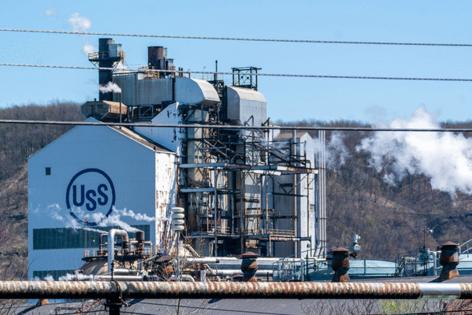Supreme Court's pause of 'good neighbor' air quality rule praised by US Steel, panned by environmental groups
Published in News & Features
A U.S. Supreme Court decision that placed a hold on an Environmental Protection Agency air pollution-fighting plan drew criticism some state environmental groups, while U.S. Steel said the company appreciated the nation's highest court pausing the plan while it is being litigated in lower courts.
The ruling on the "good neighbor" air quality rule is the latest back-and-forth between the local steel industry and organizations that say more needs to be done to improve air quality in the region. The rule, adopted by the EPA, aims to protect states that are downwind from other states where pollution occurs due to industrial activity and other similar sources.
Pennsylvania was one of the states affected by the rule, which requires that the state submit documentation to the EPA showing how it is reducing air pollution drifting into other nearby states, known as a "good neighbor" plan.
The Supreme Court granted a request from multiple states and U.S. Steel that the "good neighbor" rule be paused while it works its way through the lower courts.
David Masur, executive director of PennEnvironment, said the Supreme Court's decision was horrible for public health and air quality in the region.
Masur said that the court's decision to step in while the rule was being litigated in other lower courts was troubling — and the court majority's opinion that the EPA was insufficient in its legal arguments was flawed, he said.
"We know when we implement the best available technologies, time and time again, studies show that's good for public health," Masur said. "So the idea that the EPA didn't game out every possible scenario, and therefore we can't know the potential outcome, that's a bit misleading."
Patrick Campbell, executive director of Group Against Smog and Pollution, said it's likely that without the rule, air quality in the Pittsburgh region and Pennsylvania will suffer.
That's bad for the elderly and the immunocompromised, he said.
And Allegheny County already has some of the highest percentages of residents with asthma in the country, Campbell added.
U.S. Steel officials, however, lauded the Supreme Court's decision to let the rule be litigated before any other enforcement occurs.
"U.S. Steel remains committed to protecting the environment and will continue to work with EPA in developing regulations that have meaningful impacts and are well grounded in science and law. Unfortunately, the current Good Neighbor Rule fails to meet any of these objectives," the company wrote in a statement.
But Campbell said that beyond the legalese and technical aspects of the case, it's important that companies do everything they can to create a healthier environment, including air quality across state lines.
"Industry groups overall have argued the cost of implementing the rule is too high, and GASP's feeling is that we can't put a price tag on public health," he said.
The Allegheny County Health Department declined to comment on the Supreme Court's ruling.
_____
(c)2024 the Pittsburgh Post-Gazette Distributed by Tribune Content Agency, LLC.







Comments